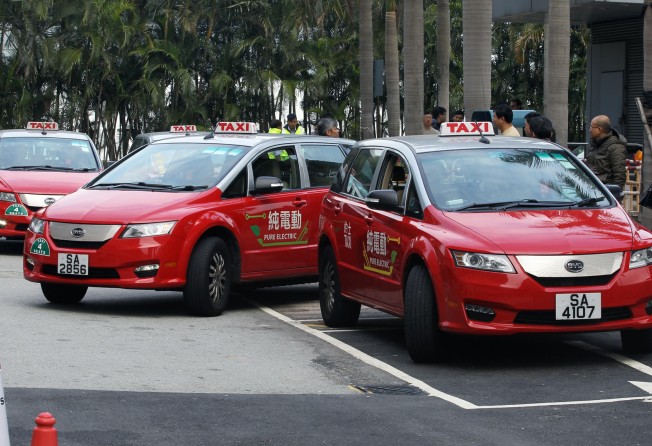
Government's electric-cab plan fails to spark more suppliers' interest
Three of the city's four suppliers of electric cars say they are not keen on a government scheme to convert their green vehicles into taxis

A government initiative to encourage more electric taxis onto the roads has failed to spark electric car suppliers' interest.

At present, only four models of electric private cars are available in Hong Kong - the Mitsubishi i-MiEV, Nissan Leaf, Renault Fluence ZE and BYD e6. The BYD cars are already being used as taxis, with 45 on the roads.
The department hopes the new charging spaces will encourage suppliers to convert cars for use as taxis. It plans to issue an open invitation to all electric taxi suppliers worldwide to submit models for approval before June.
Priority will be given to existing suppliers of Hong Kong electric taxis, which for the moment is BYD. Other suppliers whose electric taxis have been approved by the Transport Department but are not yet in operation, or who provide electric taxis outside Hong Kong, were also eligible, a spokeswoman said.
Except BYD, the other three electric-car models in Hong Kong said they were not interested in the government's initiative, arguing their vehicles were not suitable for taxi use.
Eric Wong, of Nissan's public vehicle department, said the company had no plans to convert its cars for use as taxis in the near future, although in 2012 the company announced plans to introduce 50 Leaf vehicles in Hong Kong for trial as electric taxis.
He said Nissan cars can go for 180 kilometres after each charging session while BYD has said its cars can go for 240 kilometres per charge. This made Nissan models unsuitable for use as taxis. There would also not be enough chargers for drivers if only government car parks had them.
Wong's colleague, Elvin Leung Wai-keung, said some private car parks were already offering space for BYD chargers, making it more difficult to convince them to allocate more space for other makes of electric cars.
Renault assistant sales and marketing manager Kenson Chan Chun-pong said its cars were also unsuitable for taxi use because they could run for only 120 kilometres per charge.
"BYD will be the winner in the scheme as it favours cars that are already running on Hong Kong streets," he said.
William Lee, senior marketing officer for Mitsubishi distributor Universal Cars, said the i-MiEV was too small for taxi use.
A BYD spokesman said the company was willing to import more electric taxis into Hong Kong and welcomed the government scheme.
An industry insider said one issue inhibiting the growth of electric taxis in Hong Kong was the fixed number of taxi licences. If a cabbie wanted to switch to an electric taxi, he must give up his LPG taxi. Owners were generally reluctant to do so, he said.
Wong Chung-keung, chairman of the Taxi and Public Light Bus Association, which rents taxis from BYD, said suppliers were "cautious" about contacting the association because of the scarcity of charging stations.
But the association was willing to add other electric cars to its fleet if other suppliers approached it, he said.
The Transport Department said six car parks across the city had been selected for the pilot scheme. It estimated up to 50 chargers could be installed in all.
It had yet to receive any new applications for approval of an electric car model for use as a taxi.